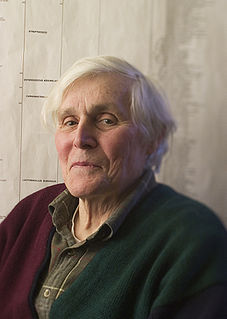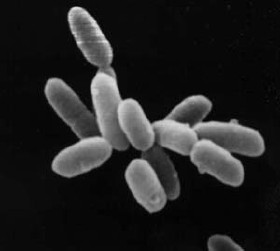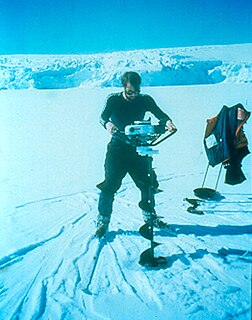Related Research Articles

Carl Richard Woese was an American microbiologist and biophysicist. Woese is famous for defining the Archaea in 1977 by phylogenetic taxonomy of 16S ribosomal RNA, a technique he pioneered that revolutionized microbiology. He also originated the RNA world hypothesis in 1967, although not by that name. Woese held the Stanley O. Ikenberry Chair and was professor of microbiology at the University of Illinois at Urbana–Champaign.

The American Society for Microbiology (ASM), originally the Society of American Bacteriologists, is a professional organization for scientists who study viruses, bacteria, fungi, algae, and protozoa as well as other aspects of microbiology. It was founded in 1899. The Society publishes a variety of scientific journals, textbooks, and other educational materials related to microbiology and infectious diseases. ASM organizes annual meetings, as well as workshops and professional development opportunities for its members.
Microbial genetics is a subject area within microbiology and genetic engineering. Microbial genetics studies microorganisms for different purposes. The microorganisms that are observed are bacteria, and archaea. Some fungi and protozoa are also subjects used to study in this field. The studies of microorganisms involve studies of genotype and expression system. Genotypes are the inherited compositions of an organism. Genetic Engineering is a field of work and study within microbial genetics. The usage of recombinant DNA technology is a process of this work. The process involves creating recombinant DNA molecules through manipulating a DNA sequence. That DNA created is then in contact with a host organism. Cloning is also an example of genetic engineering.

The Max Planck Institute for Terrestrial Microbiology is a research institute for terrestrial microbiology in Marburg, Germany. It was founded in 1991 by Rudolf K. Thauer and is one of 80 institutes in the Max Planck Society (Max-Planck-Gesellschaft). Its sister institute is the Max Planck Institute for Marine Microbiology, which was founded a year later in 1992 in Bremen.

Gustavo Caetano-Anollés is Professor of Bioinformatics in the Department of Crop Sciences, University of Illinois at Urbana-Champaign. He is an expert in the field of evolutionary and comparative genomics.

Archaea constitute a domain of single-celled organisms. These microorganisms lack cell nuclei and are therefore prokaryotes. Archaea were initially classified as bacteria, receiving the name archaebacteria, but this term has fallen out of use.

Microbiology is the scientific study of microorganisms, those being unicellular, multicellular, or acellular. Microbiology encompasses numerous sub-disciplines including virology, bacteriology, protistology, mycology, immunology and parasitology.

Cellular microbiology is a discipline that bridges microbiology and cell biology.
Norman Richard Pace Jr. is an American biochemist, and is Distinguished Professor of Molecular, Cellular and Developmental Biology at the University of Colorado. He is principal investigator at the Pace lab.

Edward Francis DeLong, born 1958, is a marine microbiologist and professor in the Department of Oceanography at the University of Hawaii, Manoa, and is considered a pioneer in the field of metagenomics. He is best known for his discovery of the bacterial use of the rhodopsin protein in converting sunlight to biochemical energy in marine microbial communities.

Alexandra (Alex) Z. Worden is a microbial ecologist and genome scientist known for her expertise in the ecology and evolution of ocean microbes and their influence on global biogeochemical cycles.
Rudolf Amann is a German microbiologist and director at the Max Planck Institute for Marine Microbiology (MPIMM) in Bremen, and since 2001 Professor of Microbial Ecology at the University of Bremen.

Vivian Helena Pellizari is a Brazilian Antarctic scientist known for her work on establishing Antarctic microbiology in Brazil. Pellizari is the head of Department of Oceanographic Biology at Oceanographic Institute of University of São Paulo.
Mary Ann Moran is a distinguished research professor of marine sciences at the University of Georgia in Athens. She studies the role of bacteria in Earth's marine nutrient cycles, and is a leader in the fields of marine sciences and biogeochemistry. Her work is focused on how microbes interact with dissolved organic matter and the impact of microbial diversity on the global carbon and sulfur cycles. By defining the roles of diverse bacteria in the carbon and sulfur cycles, she connects the biogeochemical and organismal approaches in marine science.
Dr. Mitchell Sogin is a distinguished senior scientist at the Marine Biological Laboratory in Woods Hole, Massachusetts, whose research investigates the evolution and diversity of single-celled organisms.
Nikos Kyrpides is a Greek-American bioscientist who has worked on the origins of life, information processing, bioinformatics, microbiology, metagenomics and microbiome data science. He is a senior staff scientist at the Berkeley National Laboratory, head of the Prokaryote Super Program and leads the Microbiome Data Science program at the US Department of Energy Joint Genome Institute.
Renee Elizabeth (Liz) Sockett is a professor and microbiologist in the School of Life Sciences at the University of Nottingham. She is a world-leading expert on Bdellovibrio bacteriovorus, a species of predatory bacteria.
The Fleming Prize Lecture was started by the Microbiology Society in 1976 and named after Alexander Fleming, one of the founders of the society. It is for early career researchers, generally within 12 of being awarded their PhD, who have an outstanding independent research record making a distinct contribution to microbiology. Nominations can be made by any member of the society. Nominees do not have to be members.

Abigail A. Salyers was a microbiologist whose research focused on bacteria in the intestinal tract contributing to better understanding of antibiotic resistance and mobile genetic elements. She was awarded numerous teaching awards, an honorary degree from ETH Zurich and was a past president of the American Society for Microbiology.
Karine Gibbs is a Jamaican American microbiologist and immunologist and an Associate Professor in the Department of Plant and Microbial Biology at the University of California, Berkeley. Gibbs’ research merges the fields of sociomicrobiology and bacterial cell biology to explore how the bacterial pathogen Proteus mirabilis, a common gut bacterium which can become pathogenic and cause urinary tract infections, identifies self versus non-self. In 2013, Gibbs and her team were the first to sequence the genome of P. mirabilis BB2000, the model organism for studying self-recognition. In graduate school at Stanford University, Gibbs helped to pioneer the design of a novel tool that allowed for visualization of the movement of bacterial membrane proteins in real time. In 2020, Gibbs was recognized by Cell Press as one of the top 100 Inspiring Black Scientists in America.
References
- 1 2 3 "Rachel J Whitaker | The School of Molecular and Cellular Biology | University of Illinois Urbana-Champaign". mcb.illinois.edu. Retrieved 2021-03-20.
- ↑ Whitaker; Barton, eds. (2018-05-01). Women in Microbiology. American Society of Microbiology. doi:10.1128/9781555819545. ISBN 978-1-55581-954-5.
- ↑ "Research | Whitaker Lab" . Retrieved 2021-03-20.
- 1 2 "Project MICROBE" . Retrieved 2021-03-20.
- ↑ "I-STEM—Cena y Ciencias". www.istem.illinois.edu. Retrieved 2021-03-20.
This article needs additional or more specific categories .(July 2021) |